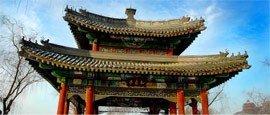Travel to Beijing
Flying to Beijing
Airlines offering direct flights to Beijing from the UK include British Airways and Air China. From the USA, Air China and United run direct flights. You can get good deals throughout the year, but try to avoid Chinese public holidays, especially Chinese New Year (usually February). The first week in May and October are also expensive times to fly to Beijing, as are the school summer holidays, (July to September). The cheapest deals are almost always on indirect flights.
From London - 11 hours; New York - 14 hours; Los Angeles - 12 hours; Toronto - 13 hours; Sydney - 11 hours.
Website:en.bcia.com.cn
Location:
Beijing Capital International Airport is situated 32km (20mi) northeast of Beijing's city centre.
Luggage:
Left-luggage facilities are available in T2 (near gates 8, 9 and 10) and in T3 (arrivals hall). Porters are on hand to assist passengers with baggage for a fee; call 64593685 (T2), 64591313 (T3), or arrange for the service in the departures hall and baggage claim areas. The lost and found desks are in T2 (near gate 15), in T3 (east of Exit A), and can also be reached on +86 10 96158.
Travel by road
A Chinese driving licence is required to drive in China, and to get one of those you must have a Chinese residence permit, rather than just a tourist visa. Foreign residents may bring their own cars into the country but this involves a huge bureaucratic effort. Urban driving is chaotic, sometimes extremely congested, and it often seems as though little attention is paid to rules and regulations. Traffic drives on the right and the minimum driving age is 18. The speed limit in China is 30-60kph (19-37mph) on city roads and 100-120kph (62-75mph) on expressways. Road signs are in both Chinese and English in major cities, but only in Chinese in more remote areas. Foreigners who want to travel by car within China are generally recommended to hire a car with a local driver.
There is no breakdown service in China.
The Airport Expressway connects the city with the Beijing Capital International Airport.
Main routes out of Beijing are denoted by city names such as the Beijing-Harbin Expressway (Jingha Expressway in short), Beijing-Shanghai Expressway, Beijing-Shenyang Expressway, Beijing-HongKong-Macau Expressway, and Badaling Expressway. The local governments are constantly planning more routes to ease congestion.
From Taiyuan - 6 hours; Chengde - 3 hours 30 minutes; Tianjin - 2 hours.
Travelling by coach to smaller provincial towns can be hair-raising, with poor-quality buses and even poorer quality driving. But coach travel between major cities is convenient and generally pretty comfortable. Coach quality ranges from old, run-down, smoke-filled bone-rattlers that stop at every small town en route, to modern, air-conditioned coaches with TV, reclining seats and hostesses dishing out free mineral water. You get what you pay for. If there's a sleeper coach available, take it. Overnighting on a coach is never as comfortable as on a train, but coach tickets are much easier to come by because services are so frequent, meaning there's often no need to book. Note, tickets on the newer, modern coaches tend to be more expensive than trains. There are dozens of bus and coach stations in Beijing, but the main long-distance stations are Bawangfen and Sihui, in the east of the city, and Liuliqiao and Lianhuachi, both close to each other in the southwest. Dongzhimen Transport Hub Station, which is connected to the subway system, is also handy for buses to nearby destinations.
Travel by rail
China's extensive railway system is a world leader in terms of speed and efficiency, although tickets (particularly hard-sleeper tickets) are often hard to come by, and buying them can be tough for non-Chinese speakers. Your hotel can normally help.
Trains in China have up to four classes - hard seat, soft seat, hard sleeper and soft sleeper. Hard-sleeper tickets (the beds aren't literally hard) are like gold dust. You can buy tickets in stations or through CITS (tel: +86 10 6522 2991; www.cits.net). You should make reservations in advance, especially for hard sleepers, although you cannot book more than 10 days in advance. The useful website www.travelchinaguide.com/china-trains has an English-language timetable and lets you book tickets, for a hefty fee. Beijing has three main railway stations. The most central, Beijing Railway Station, serves the north and east. The newer Beijing West Railway Station serves the south and west. The super modern Beijing South Railway Station has high-speed trains to Tianjin and Shanghai.
State operator China Railways runs all train services in China. Trans-Siberian services to Russia and Mongolia leave from Beijing Railway Station. You need to buy tickets from the CITS office inside Beijing International Hotel, one block north of the station. The China-Tibet railway runs from Beijing West Railway Station, as do trains to Hong Kong and Vietnam.
From Moscow - 5-6 days; Lhasa - 41 hours; Hong Kong - 24 hours; Guangzhou - 9 hours; Xian - 5 hours 30 minutes; Shanghai - 5 hours.
Do you have any Feedback about this page?
© 2026 Columbus Travel Media Ltd. All rights reserved. No part of this site may be reproduced without our written permission, click here for information on Columbus Content Solutions.








 You know where
You know where